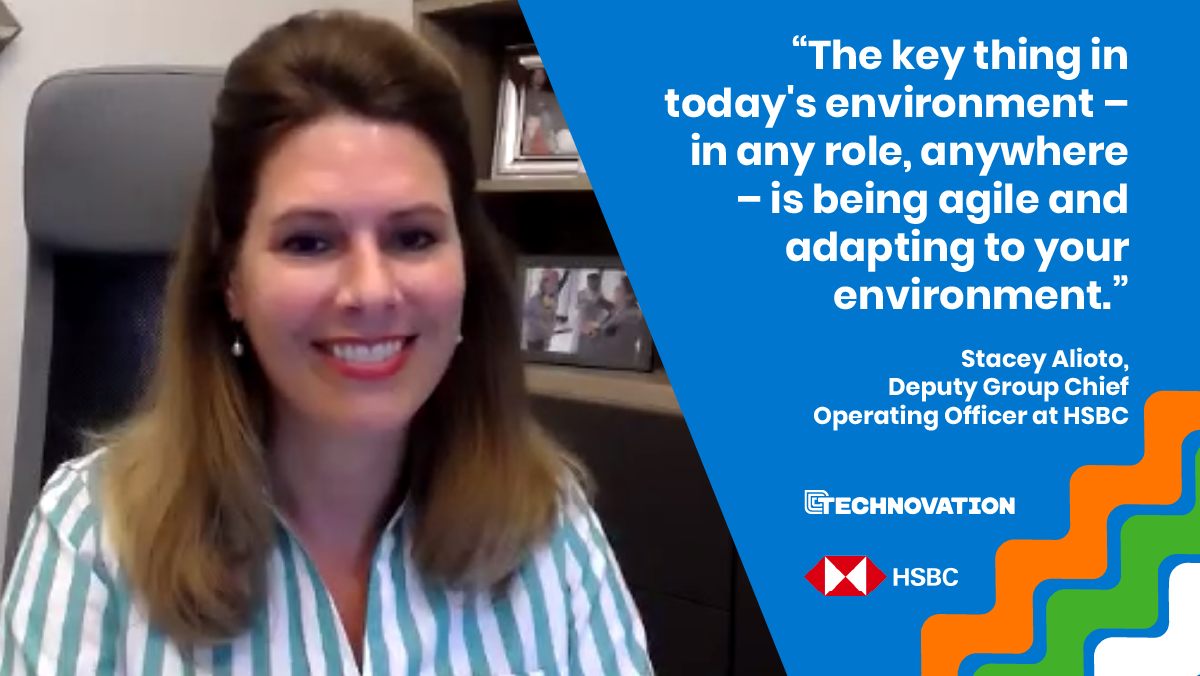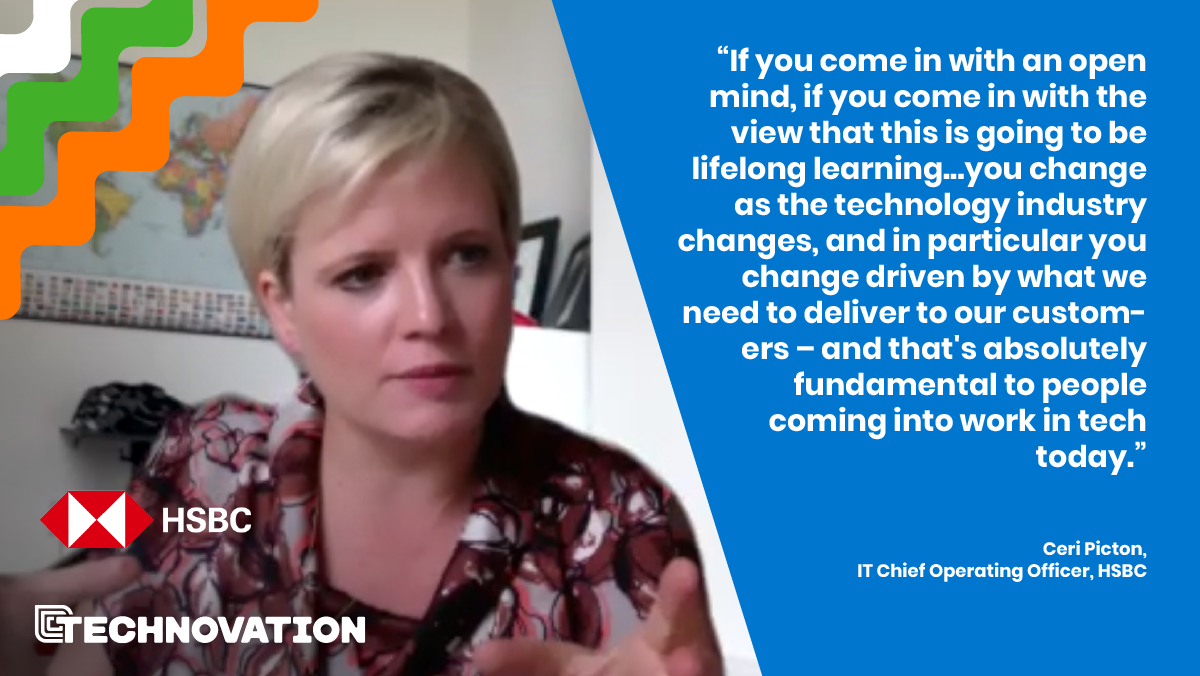During this year’s World Summit, HSBC hosted a virtual tour of life at HSBC which included a Q & A session with three senior women at the company. Stacey Alioto, Deputy Group Chief Operating Officer, Pingping Chen, Senior Data Scientist, and Ceri Picton, IT Chief Operating Officer joined Technovation CEO Tara Chklovski and Sr. Director of External Relations and Mentor Programs Bryant Gomer to talk about their career paths, their skills, tapping into passion to fuel your career, and the skills they think are most valuable for today’s (and tomorrow’s!) workplace.
HSBC is one of the largest banking and financial services organizations in the world, with operations in 64 countries and territories. They aim to be where the growth is, enabling businesses to thrive and economies to prosper, and, ultimately, helping people to fulfill their hopes and realize their ambitions. At Technovation we see this reflected in their generous support of our programs – part of which includes supporting the development of an even stronger entrepreneurship curriculum. Together with HSBC we will create materials that better teach girls and families how to develop robust business plans and successfully bring their ideas to market.
We were delighted to have the opportunity for Stacey, Pingping and Ceri to share their advice and insights directly with our global community during the World Summit. You can watch an edited version of their panel, or keep reading for highlights of their conversation.
Career paths don’t have to be straight
Pingping, Stacey, and Ceri began by sharing their personal journeys to HSBC. Although they all grew up in different places, studied different subjects, worked at different companies in different roles, their stories share a common theme: their careers didn’t have a straight path.

Pingping studied physics at university and then found her way to artificial intelligence – “I found that AI was such a powerful tool, that it could turn numbers into magic.” That sense of magic led PingPing to work in AI and data science at companies like Microsoft, Yahoo, and Baidu. After 10 years, Pingping realized she wanted a different challenge, and she left Beijing, her home of 14 years, for Hong Kong, to work at HSBC. Although a big change, Pingping was able to transfer her existing knowledge to specific financial use cases. “The feeling of entering a new area, facing a challenge, and finding the proper result … just gave me a big sense of completion.”
Ceri has also had a career full of twists and turns – from new media to mobile companies to banking after studying Physics at university. Like Pingping, Ceri loves to do new things and take on new challenges, something that led her to HSBC, where she finds great opportunities for innovation. “I think that’s the reason I swapped over into banking – it’s always the challenge, the ability to do something new and do something amazing for customers.” Ceri also oversees the technology graduate program where she helps recent graduates develop a breadth of skill and experience.
That spirit of adventure and chasing interests and new challenges was a common theme for Stacey as well. Stacey grew up in a military family, which meant moving around a lot – she’s lived in 5 different countries and 8 different states! This sort of change inspires Stacey because it creates an environment of constant growth and development. Stacey began her career at a smaller firm that was acquired by HSBC, a turn that has allowed her to live out her dream of becoming an international business person.
Building new skills today, and tomorrow
In the time of COVID-19, there have been changes at HSBC and how its employees collaborate and serve customers and clients, as well as what a typical day looks like for Stacey, Pingping, and Ceri (as it has for so many of us). Ceri discussed her efforts to adapt technologist training – usually a 2-week, in-person session – into an online training for people working in different environments. This adaptability and ability to pivot is key for Stacey, who had to shift to make sure employees had the tools and training they needed to succeed, including resilience. Stacey also shared something that we think is golden advice, even beyond the current pandemic – “the key thing in today’s environment – in any role, anywhere – is being agile and adapting to your environment.”

Part of that adaptability is coordinating video calls across timezones as a member of an international company, and part of that adaptability is continuing to develop new skills themselves. For instance, Pingping shared that she’s focusing on developing her existing skills, including machine learning and big data strategy, as well as her business and social communication skills. Ceri is focused on developing her social communication skills, a critical skill for someone who manages 1,500 people and interacts with 5,000. Stacey shared that she’s working on her self-awareness, a skill critical to hone to be a successful leader. All of the women also emphasized the importance of well-being, whether it’s replacing tennis in a park with table tennis with your parents, like Pingping, or a morning jog like Stacey.
As for the skills the panelists find most important for the workplace of tomorrow, Pingping, Stacey, and Ceri all emphasized that same adaptability and resilience we are all being asked to practice right now. Ceri explained that for technologists it’s not just about being able to code in a specific language. Instead, engineers need to have a large skill set that allows them to pivot from one language to the next, and also understand the customer journey and how to make that journey as smooth as possible for a wide range of users of different abilities. “If you come in with an open mind, if you come in with the view that this is going to be lifelong learning…you change as the technology industry changes, and in particular you change driven by what we need to deliver to our customers – and that’s absolutely fundamental to people coming into work in tech today.”

What you need to succeed
When asked to share their advice to young people interested in technology, or succeeding in any career, Pingping, Stacey, and Ceri offered up a lot of excellent advice:
- Follow your passions and your interests, and chase what’s interesting to you. Don’t be afraid of facing the unknown or of encountering difficulties, trust your passion, and never give up.
- Push yourself and explore your curiosity. Stacey shared advice she received from one of her mentors when she was starting out – “if you don’t have butterflies in your stomach several times throughout the year, you’re not pushing yourself hard enough.” What gives you butterflies might be very different from what gives your friend butterflies, but that idea of pushing yourself is tied to developing confidence in yourself and your abilities, as well as to curiosity and exploration.
- You’re in charge of your own goals and career – find confidence in yourself. Stacey also told us “it’s not up to your parents, it’s not up to your teachers, it’s not up to someday your boss. It sits with you. You have to lead your career, your ambitions, your goals.” And that might sound intimidating, but you’re not alone and you’re not unsupported, which brings us to another piece of advice … find a mentor who can help you achieve your goals.
- Jump in with both feet. Ceri reminded us that a diverse workforce is a stronger workforce that builds better products, and encouraged us all to be brave and really go after our goals and our interests. “Jump in with both feet! You’ll be rewarded by jumping into an industry developing things that five years ago we never could have imagined.”
On finding passion
Passion is powerful, but what if you haven’t found yours yet? What if you’re not sure what you want to do with your career, or what you want to study? The panelists reminded us that that’s okay. It’s normal to have periods where you’re not sure what you want to do, or to feel like you can’t find your passion. And Ceri, Pingping and Stacey all emphasized the importance of taking it easy on yourself – don’t put more pressure on an already pressurized situation. Use this time to explore what you think you might be interested in, or what you like – take your time to brainstorm and search your mind. Reach out to people you care about, who care about you. Spend time outside, take time from work, slowly tease out what you’re interested in and you’ll naturally be able to find the next steps. Above all, use this as a time to tune in and listen to yourself. It’s okay to try things and not love them and move on. As our panelists so generously shared, a career path doesn’t have to be straight and direct for you to feel deeply satisfied and fulfilled at work – and beyond.
We are so grateful to Pingping, Ceri, and Stacey for joining us at the World Summit and sharing their experience and advice so openly and warmly. And we are deeply grateful to HSBC for their ongoing support as well as their sponsorship of the 2020 Technovation World Summit.
Watch the video to catch the full conversation including an excellent Q&A session. If you’re interested in participating in the next season of Technovation Girls, sign up to be notified when registration opens in October.

